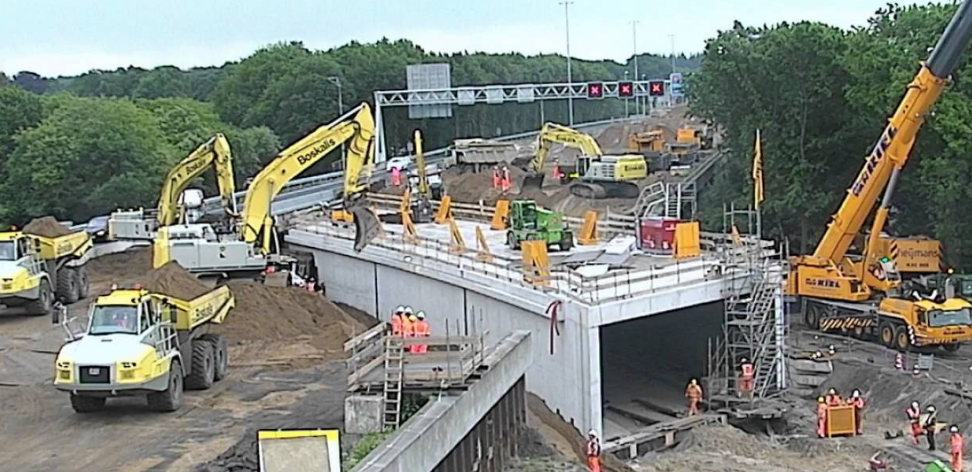Infrastructure Pros Evaluate Transportation Challenges at Summit
National infrastructure experts joined forces recently at the Mobility 21 Summit to highlight the risks and challenges to our transportation infrastructure due to uncertain state and federal funding sources and a multitude of regulatory constraints.
Innovative transportation solutions and strategies from around the globe were presented to address these challenges and provide transformative solutions for Southern California’s traveling public.
The largest one-day transportation event in the state, the 17th annual Mobility 21 Southern California Transportation Summit attracted more than 1,300 transportation, business and elected leaders. Experts from a broad spectrum of backgrounds addressed the significant challenges facing Southern California’s transportation infrastructure. This year’s conference highlighted California’s position and ability to lead the nation and world as a “transportation center of excellence” despite state funding uncertainties.
Critical funding at risk is Senate Bill 1 (SB 1), commonly referred to as the Gas Tax, which was approved by California’s Legislature and the Governor in April 2017. The Gas Tax generates funds for California’s transportation infrastructure through increased gasoline taxes and annual vehicle fees. It began providing funds to cities and counties in November 2017 for: maintenance and rehabilitation; safety improvements on state highways, local streets, roads and bridges; and for improving the state’s trade corridors, transit and active transportation facilities. In June 2018, California voters approved Proposition 69, which amended the State Constitution to prevent SB 1 funds from being diverted or borrowed for other purposes. The rapid pace of progress in building those improvements could be eliminated by the looming Proposition 6 Gas Tax repeal measure that is planned for the November 2018 election ballot.
“Californians and their families deserve the safer streets and highways, more affordable transportation, and good-paying careers that come with investing in the future of our infrastructure,” said Los Angeles Mayor Eric Garcetti. “California stands to lose billions in critical funding if SB 1 is repealed, which would devastate our ability to fix our roads and create more sustainable transit — making traffic worse, polluting our air, and eliminating thousands of good jobs that build up our middle class.”
Los Angeles County, for example, will receive $1 billion per year from the state gas tax and fees authorized by SB 1 to help galvanize its predominantly locally funded transportation projects, essentially adding the “jet fuel” to get many of these projects built as quickly as possible to help relieve congestion, improve air quality and create jobs.
“Metro is now leading a transportation renaissance in L.A. County thanks to our own locally funded Measure M and R programs,” said Metro CEO Phillip A. Washington and Mobility 21 Board Member. “Our programs also depend on significant funding participation from both the state and federal governments. These SB 1 funds will help us leverage our local funding commitments to fully and quickly implement our region’s most critically needed transportation improvements.”
“Southern California is in the midst of major investment in our transportation infrastructure – from bridges and highways, to transit lines and air and seaport modernization,” said Maria Salinas, President & CEO of Los Angeles Area Chamber of Commerce and Mobility 21 Board Member. “Mobility 21 has championed the importance of maintaining and building out our system as the foundation to our region’s economic health and mobility. Last year’s Road Repair & Accountability Act has already jumpstarted nearly 6,500 projects throughout the state; the passage of Proposition 6 this November would be devastating not just to our infrastructure, but our safety and competitiveness as the fifth largest economy in the world.”
During an exclusive media availability at the Summit with Los Angeles Mayor Eric Garcetti and transportation leaders, transportation projects considered vital to California’s mobility were highlighted for being at-risk if Proposition 6 passes. These include major improvements and safety enhancements to roads, public transit, active transportation networks, highways and bridges. The Summit also discussed key technological advances including autonomous transportation systems, hyperloop travel, microtransit and big data, all of which could be significantly impacted should state funding stall.
“For the first time in a generation, California is investing in its roads, bridges and highways thanks to the $5.4 billion in annual SB 1 revenues,” said Lucy Dunn, Commissioner, California Transportation Commission, President & CEO, Orange county Business Council and Board Member, Mobility 21. “Right now, 6,500 roadway maintenance and bridge repair projects throughout the state are underway, representing more than $183 billion in economic investment. It’s important that we preserve these funding sources so that California’s economy remains on the highway and not in a ditch.”
“After decades of under-funding our transportation system, we finally have a path forward,” said California State Transportation Agency Secretary Brian Annis. “For the past year, cities, counties, transit agencies and the state have been hard at work Rebuilding California. Critical safety and rehabilitation projects are well underway; however, without necessary funding generated by SB 1, roughly half of the projects would be cut, significantly delayed or downsized.”
Category: General Update, News











